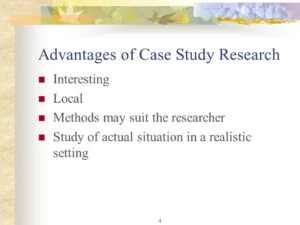Have you ever felt like regular assignment research just doesn’t cut it? Like, it’s missing the cool stuff that makes learning interesting? Well, you’re not the only one. What if there was a way to understand things better, to really get what’s going on in the real world? Imagine a method that not only gives you answers but takes you deep into the heart of a topic, uncovering all the required details. That’s where case studies come in—they’re like a guide in the confusing world of assignment writing.
What is a Case Study?
Picture this: You’re about to solve a puzzle, but instead of mere pieces, you’re dealing with the intricate layers of a real-life story. That’s what a case study does—it transforms you into a detective, peeling back layers to reveal the ‘why’ and ‘how’ behind the ‘what.’ A major advantage of case studies is their ability to provide an in-depth exploration, offering insights that traditional methods may overlook. To understand better here’s a renowned definition of a case study by Robert K. Yin:
“An empirical inquiry that investigates a contemporary phenomenon within its real-life context, especially when the boundaries between phenomenon and context are not clearly evident.” (Yin, 2003, p. 13)

Embarking on the journey of exploring the pros and cons of case studies, we will uncover their strengths, delving into how they offer a narrative-rich understanding of the world. Concurrently, we will illuminate the challenges, navigating through the limitations inherent in this unique approach. Ready to delve into the captivating tapestry of case study research? Let’s commence our quest for knowledge together, dissecting the intricacies and evaluating the advantages and disadvantages that shape the landscape of academic exploration.
Case Study Advantages And Disadvantages
Advantages of Case Study:

-
In-Depth Exploration:
Case studies facilitate a thorough examination of specific instances, bringing to light intricate details that may be overlooked in broader studies. This depth of analysis contributes to a comprehensive understanding of the subject matter, enriching academic knowledge with nuanced insights that might otherwise remain undiscovered.
-
Holistic Perspective:
When we talk about In contrast to methods isolating variables, case studies offer a holistic view of phenomena. This comprehensive approach allows researchers to explore various interconnected factors, providing a nuanced and all-encompassing understanding of the subject under investigation. It’s like seeing the entire puzzle instead of just a few pieces.
-
Contextual Richness:
When considering the benefits of case studies, case studies indeed stand out in capturing the richness of real-world contexts. By considering social, cultural, and historical elements, researchers gain insights that not only hold relevance but also find practical application in the specific environment being studied. It’s about understanding not just what happens, but why and how within a specific context.
-
Theory Development:
A major strength of case studies is their contribution to theory development. By delving into specific instances, researchers can generate hypotheses and refine existing theories. This process advances the theoretical frameworks that underpin academic disciplines, adding depth and relevance to the broader body of knowledge.
-
Flexibility in Design:
Case studies offer a flexible research design that adapts to the unique characteristics of each case. This adaptability empowers researchers to tailor their approach, ensuring it aligns with the intricacies of the subject matter. The result is a study that is not only relevant but also effective in addressing specific research questions which is why it is one of the benefits of benefits of case studies.
-
Rich Qualitative Data:
Case studies yield a wealth of qualitative data, offering insights into the complexities of human behavior, attitudes, and interactions. This qualitative richness enables a more profound analysis, allowing researchers to capture the subtle nuances that define the studied phenomena. It’s like adding color and depth to a black-and-white picture.
-
Exploratory Nature:
Well-suited for exploratory research, case studies are particularly effective in investigating new or emerging phenomena. The exploratory nature of case studies allows researchers to uncover hidden patterns, trends, or variables, acting as a gateway for further, more in-depth investigations into uncharted territories.
-
Real-World Applicability:
Perhaps one of the most impactful strengths, findings from case studies often directly apply to real-world situations. This practical relevance extends the impact of research beyond academic circles, making it valuable in informing decisions and practices across various fields. It’s about bridging the gap between theory and practical application, ensuring that research brings tangible benefits to the real world.
[Also check out: Types of Case Studies]
Disadvantages of Case Study:

-
Limited Generalizability:
A significant drawback of case studies is their challenge in generalizing findings. Focused on specific cases, these studies may struggle to apply results to broader populations or contexts. This limitation raises concerns about the external validity of the study, questioning its ability to represent situations beyond the examined cases, potentially limiting the broader impact of the research.
-
Subjectivity and Bias:
When talking about the disadvantages of case study it should be noted that the subjective nature of case studies introduces the risk of bias. Researchers’ personal preconceptions may influence the analysis, affecting the objectivity of findings. The absence of standardized procedures further contributes to inconsistencies in data interpretation. Recognizing and mitigating these subjective elements is crucial for maintaining the credibility and reliability of case study research.
-
Resource Intensity:
Conducting thorough case studies demands a substantial investment of time and resources. Researchers must dedicate extended periods to data collection and analysis, making this approach challenging in fast-paced research environments or with limited resources. The resource intensity underscores the importance of careful planning and efficient resource management in ensuring the feasibility of case study projects.
-
Difficulty in Replication:
Replicating case studies for validation poses challenges. Each case’s unique nature, combined with the dynamic aspects of real-world scenarios, makes recreating identical conditions difficult. This complexity questions the reliability and robustness of results, emphasizing the need for alternative validation methods and careful consideration of the study’s reproducibility.
-
Ethical Concerns:
Case studies may raise ethical challenges, particularly when dealing with sensitive topics or vulnerable populations. Balancing the need for research insights with participant well-being and confidentiality is complex. Implementing ethical safeguards throughout the research process becomes paramount, ensuring that the benefits of the study outweigh any potential harm to participants.
-
Lack of Control:
One major disadvantages of case study is that researchers face limited control over external factors in case studies, potentially influencing outcomes. This lack of control makes it challenging to establish clear causal relationships between variables, undermining the ability to draw definitive conclusions about cause and effect. Acknowledging and addressing this limitation is crucial for maintaining the integrity and validity of the research.
-
Overemphasis on Singular Cases:
Relying solely on individual cases may result in an overemphasis on singular instances. This narrow focus might inadvertently overlook broader patterns or trends within the studied phenomenon. Such tunnel vision can limit the overall impact and relevance of the research in contributing to larger theoretical frameworks, emphasizing the need for a balanced and holistic approach.
-
Potential for Selective Reporting:
Case studies may be susceptible to selective reporting, where researchers highlight findings aligning with their hypotheses or desired outcomes. This potential bias can compromise the integrity of the study, emphasizing the importance of transparent reporting practices. Ensuring a complete and unbiased presentation of findings is essential for maintaining the credibility and trustworthiness of case study research.
Conclusion:
In the academic toolkit, case studies stand out as both a valuable asset and a challenging terrain. Their strengths, encompassing in-depth insight, holistic understanding, contextual relevance, and theory development, render them indispensable for specific research objectives. Nevertheless, careful consideration is essential due to limitations like restricted generalizability, subjectivity, resource intensity, and replication challenges.
Approaching case studies with a balanced perspective is key for researchers. Leveraging their strengths while addressing their weaknesses allows for the optimal utilization of case study research, ensuring that contributions are not just insightful but also pertinent and applicable in the broader realm of academic inquiry. For those seeking academic support, the importance of assignment help in Canada becomes evident, acting as a guiding beacon through the challenges and triumphs of scholarly exploration.
Frequently Asked Questions (FAQs) about Case Studies
1. A major advantage of case studies is?
Case studies provide an in-depth exploration of specific instances, allowing researchers to uncover intricate details that may be overlooked in broader studies. This depth fosters a comprehensive understanding of the subject matter, contributing valuable insights to academic knowledge.
2. How do case studies differ from other research methodologies?
Unlike methods that isolate variables, case studies offer a holistic perspective by examining the entirety of a phenomenon. This comprehensive approach allows researchers to consider various interconnected factors, yielding a nuanced understanding of the subject under investigation.
3. What challenges do researchers face when conducting case studies?
Researchers conducting case studies may encounter challenges such as limited generalizability, potential subjectivity, resource intensity, and difficulty in replication. Each of these factors requires careful consideration to ensure the integrity and relevance of the study.
4. Can findings from case studies be applied to real-world situations?
Yes, findings from case studies often have direct applicability to real-world situations. The practical relevance of case study research enhances its impact, making it valuable not only in academic circles but also in informing decisions and practices in various fields.
5. How do case studies contribute to theory development in academic research?
Case studies play a pivotal role in theory development by allowing researchers to generate hypotheses and refine existing theories. Through the exploration of specific instances, scholars contribute to the evolution of theoretical frameworks, advancing understanding within their respective disciplines.


